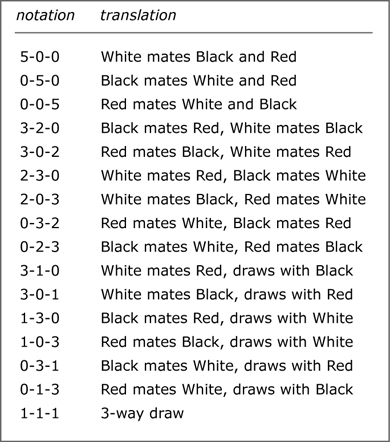Win/Lose/DrawYou win Hexes Chess for Three Players either by checkmating both opponents, or by checkmating one opponent and drawing with the other.
Draw by AgreementAll players may agree to declare a draw. Mutual consent is all that is required. Draw by StalemateWhen a player cannot make a legal move, yet is not in check, the match has ended in a draw by stalemate. Draw by Insufficient MaterialWhen no player has sufficient pieces to force a checkmate, a draw may be declared. Draw by RepetitionIf a player is about to repeat a position for a third time, that player may declare a draw by repetition. (The term "position" here means the precise arrangement of all the pieces on the board at a given time.) If the player who completes the third repetition does not declare a draw, either opponent may then declare it. This type of draw cannot be declared without an undisputed record of the match. Fifty-Move RuleIf during the previous fifty moves no pawn has been moved and no capture has been made, any player can claim a draw. (For this purpose a "move" consists of a player completing their turn followed by the opponent completing their turn). |
 • A draw earns one point.
• A draw earns one point.
